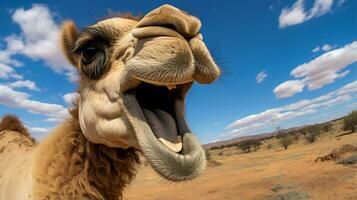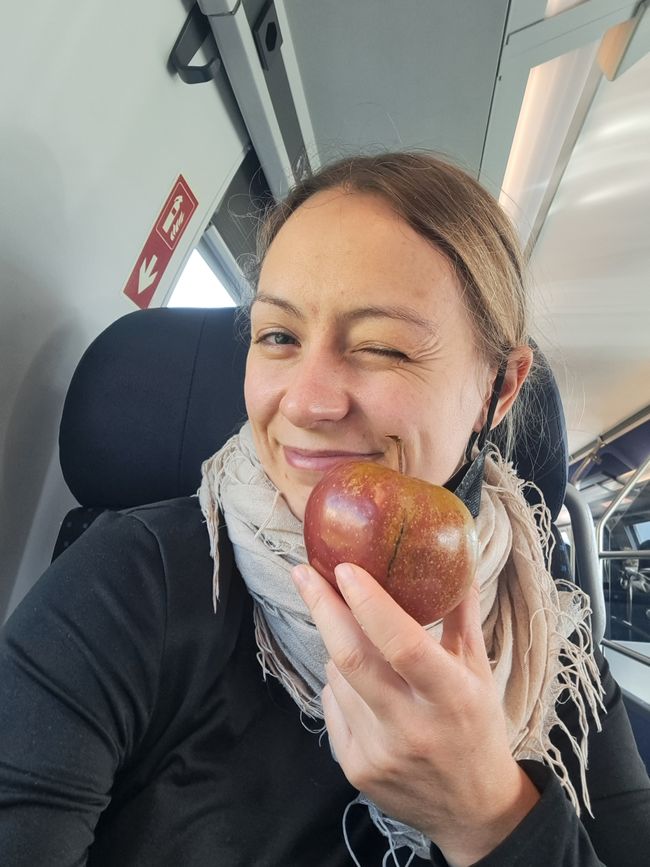Sahara, Sabára, Sanäthu and Mohammed
פֿאַרעפֿנטלעכט: 06.10.2024
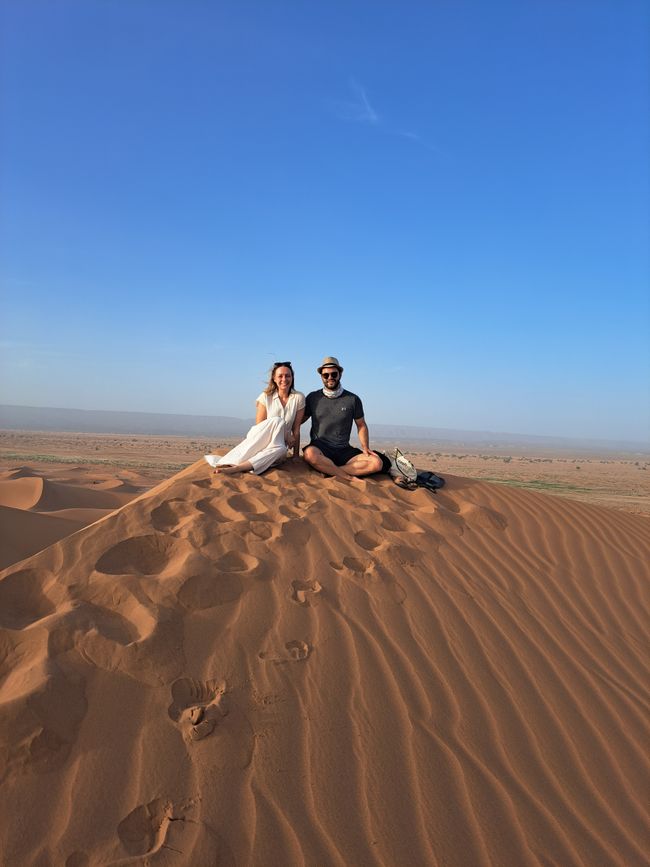
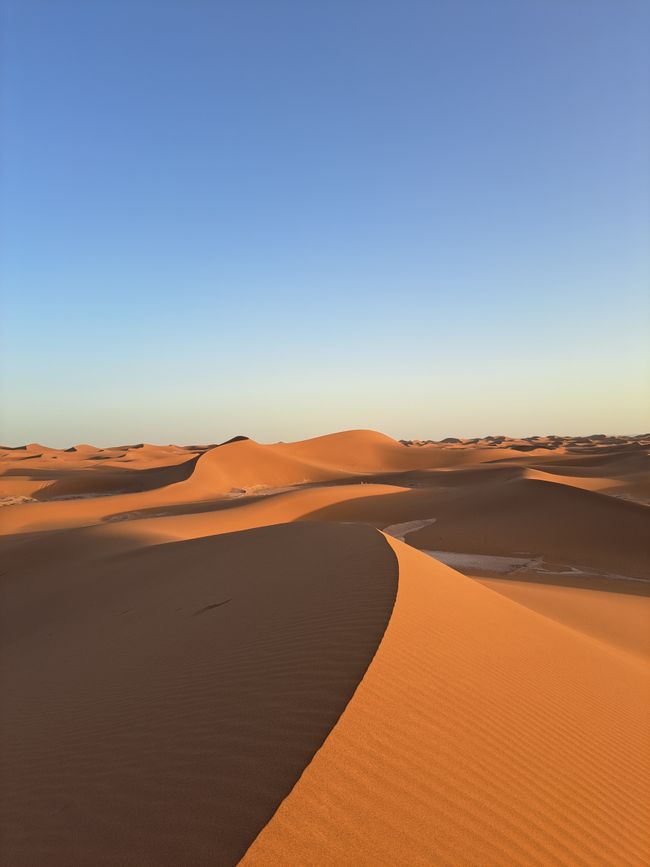
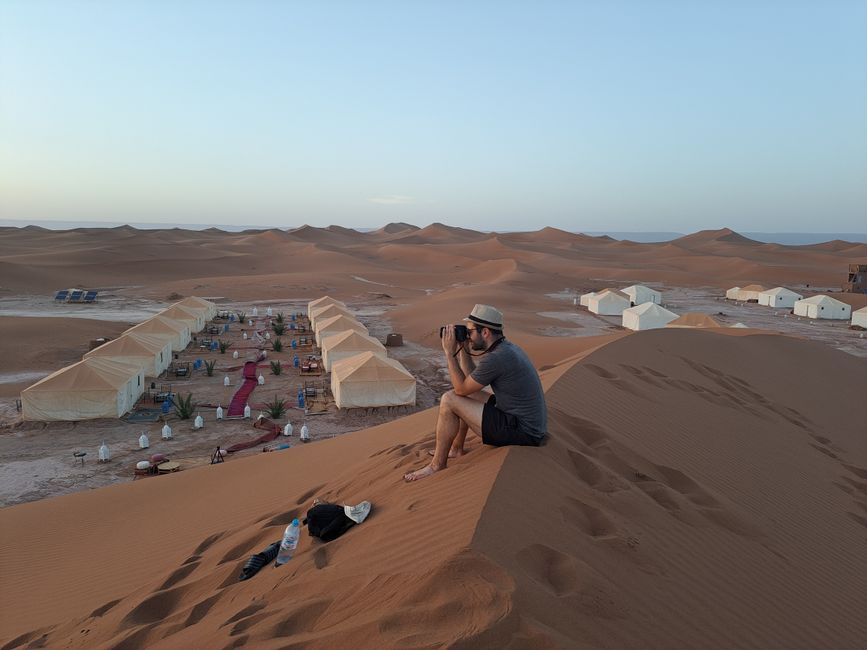
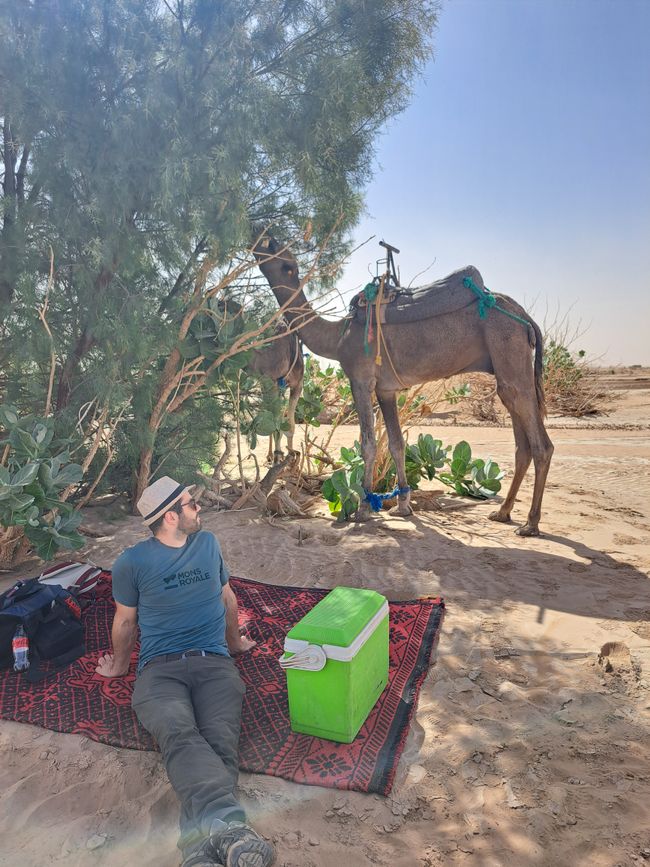
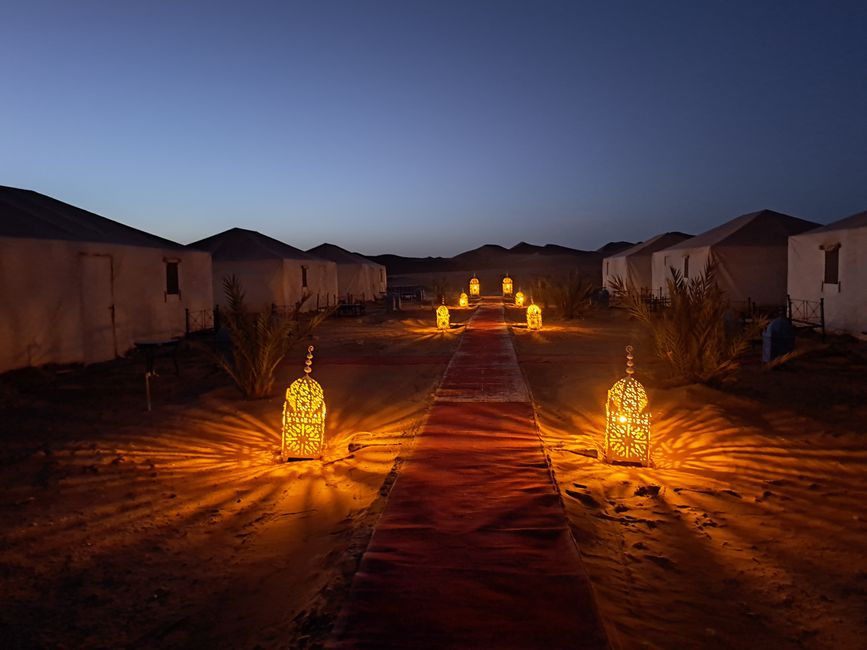
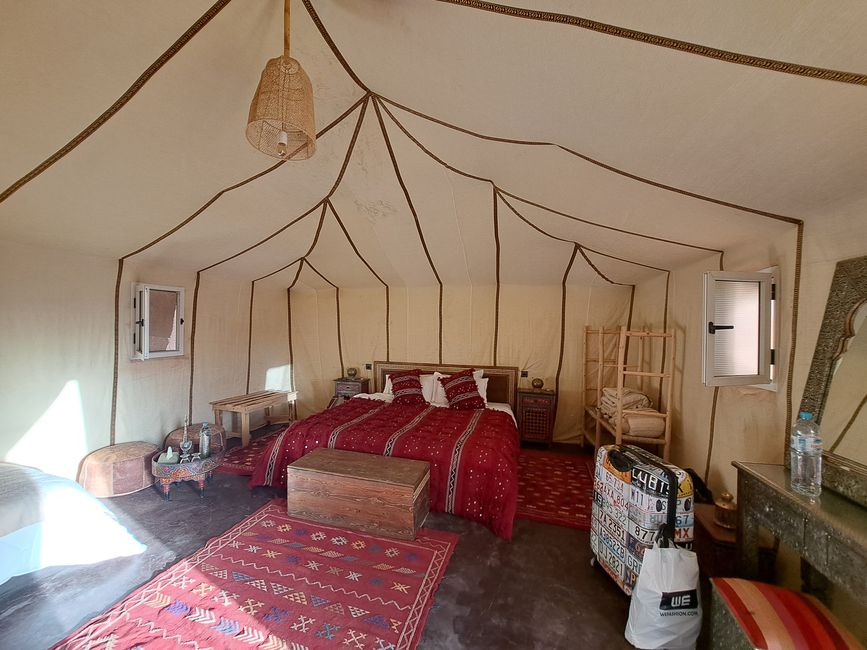
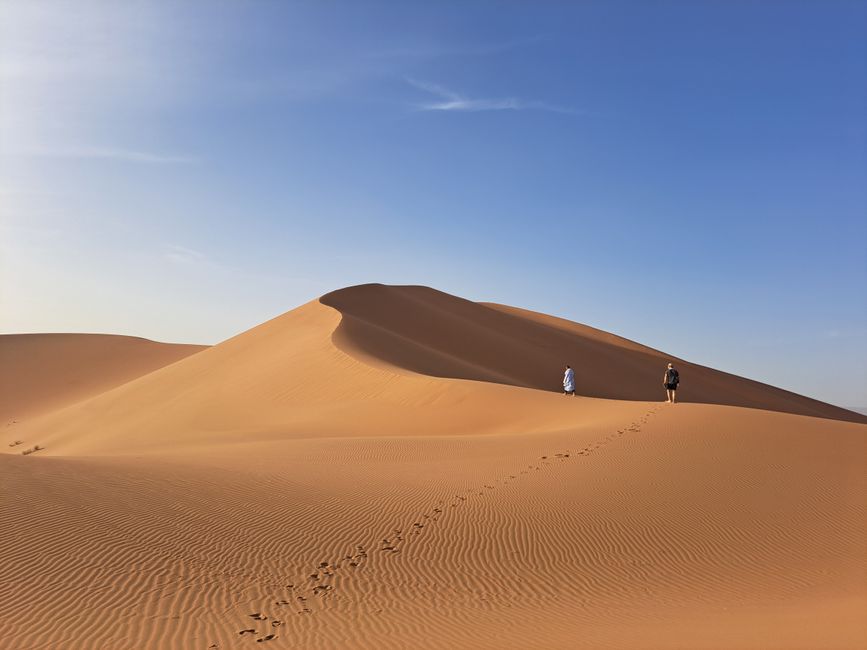
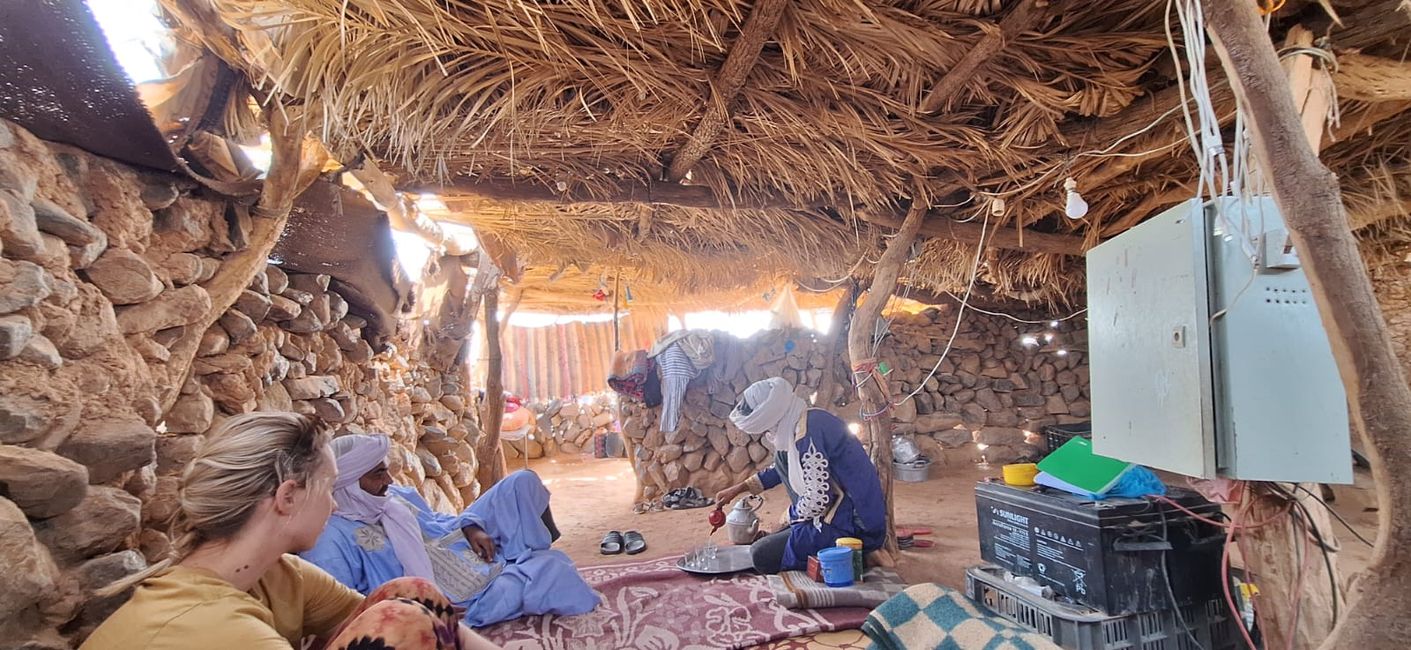
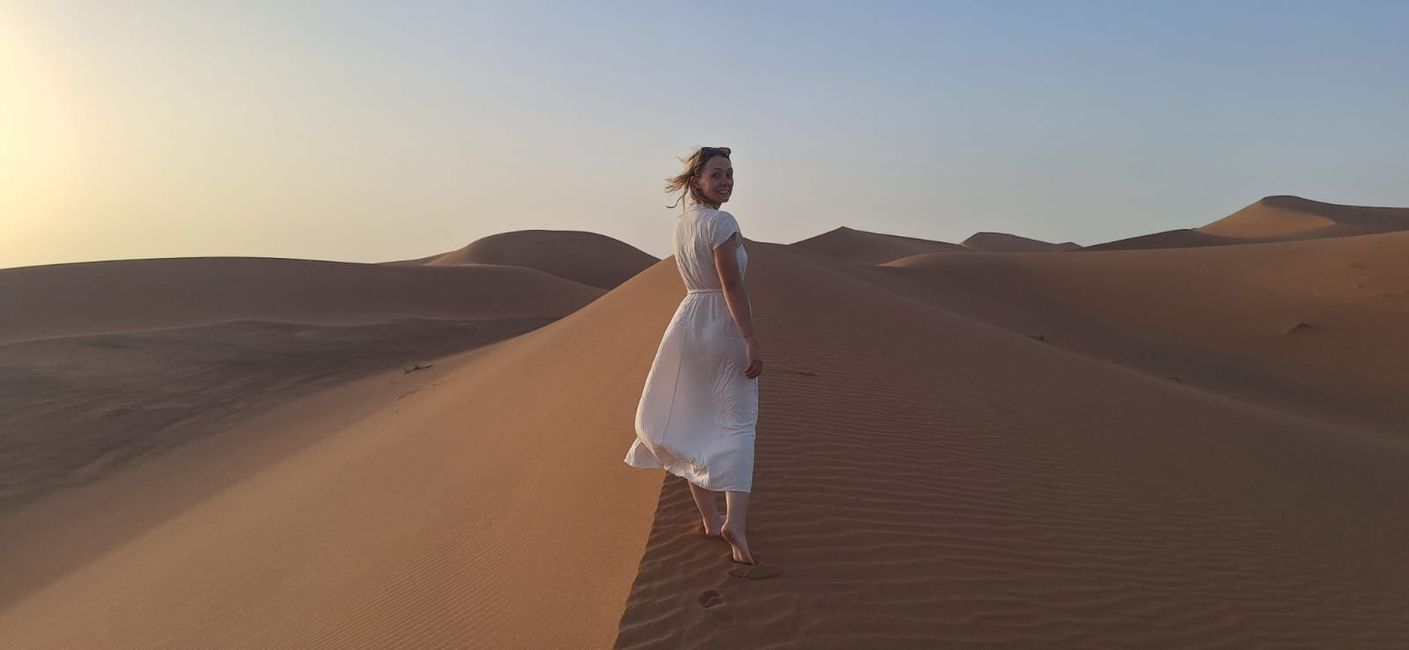
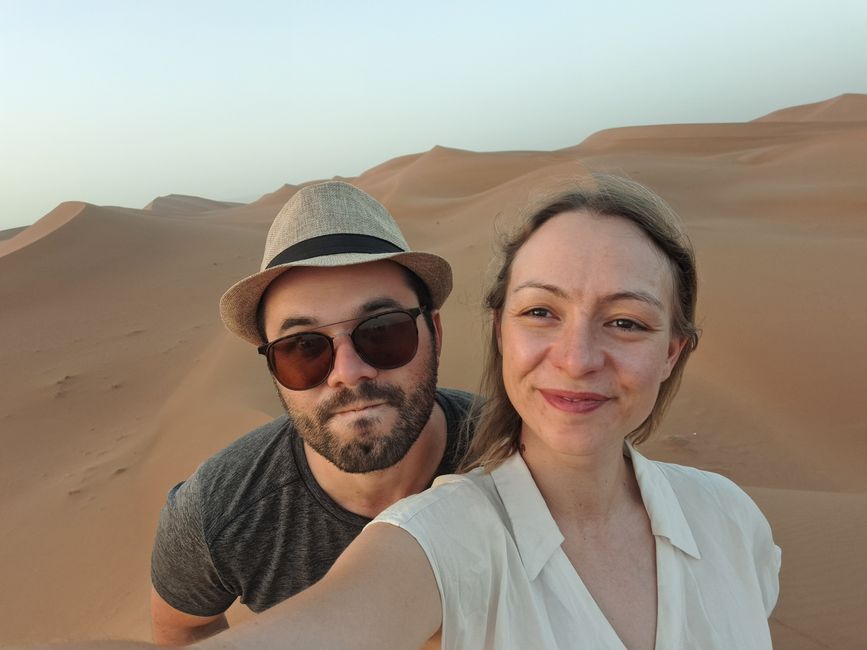
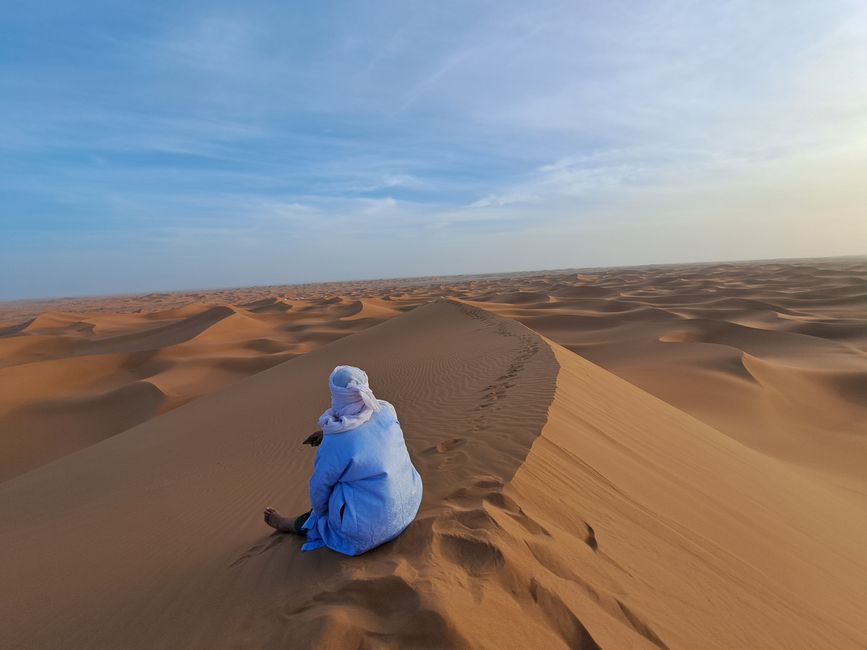
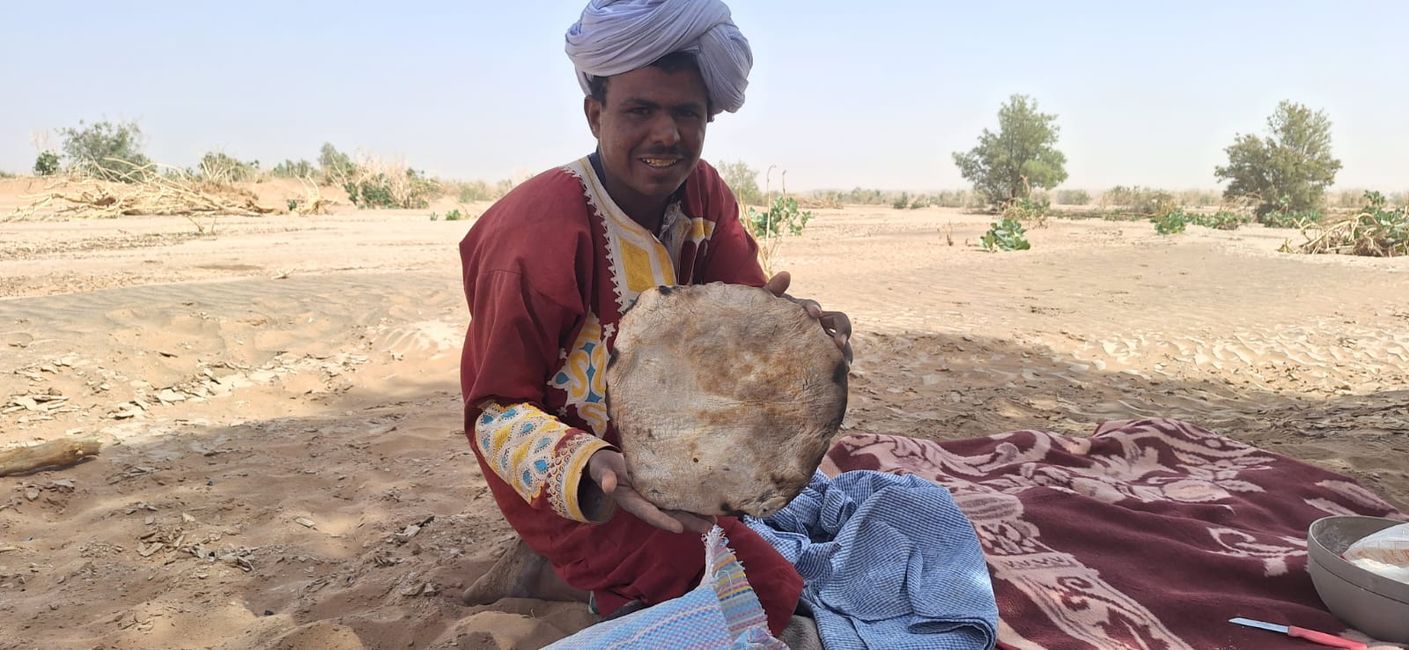
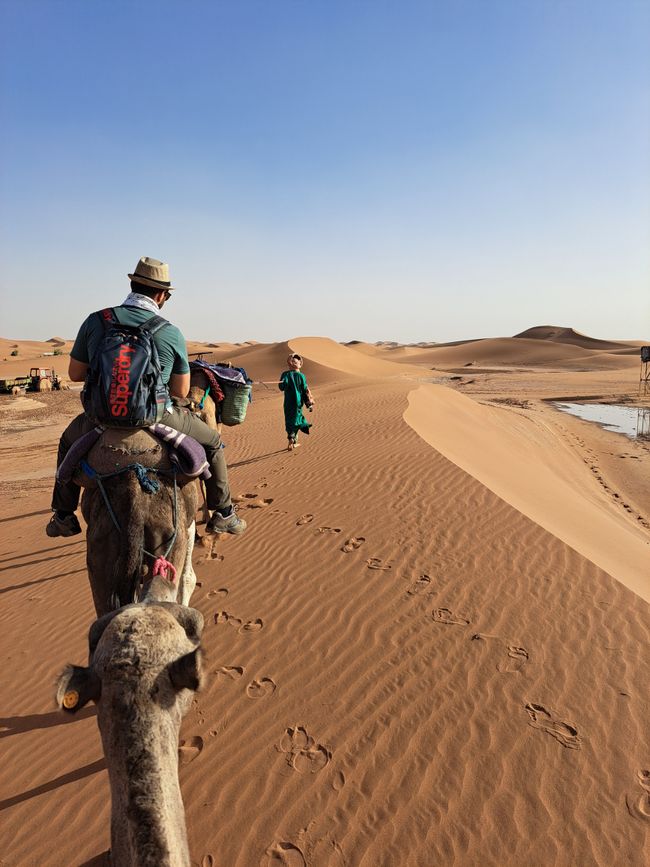
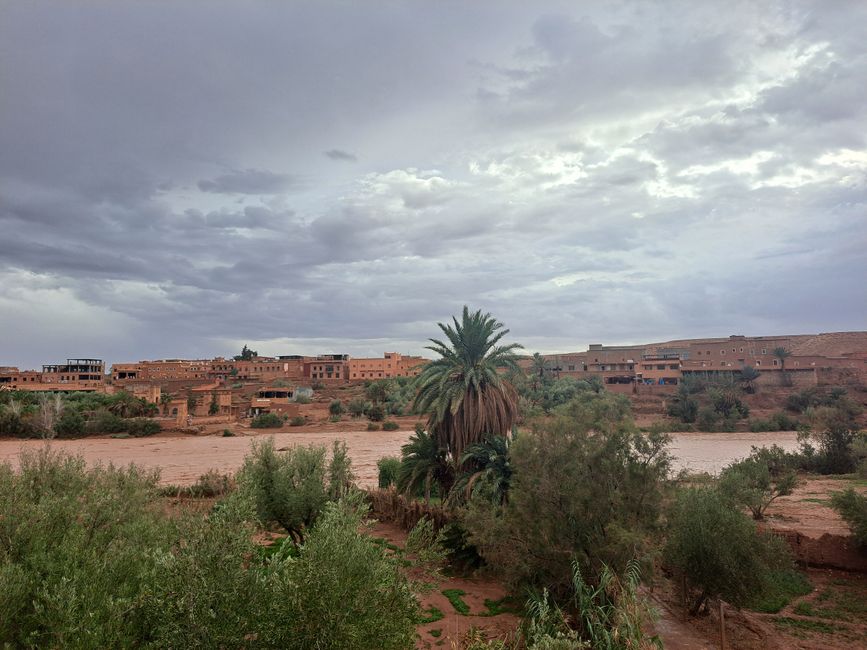
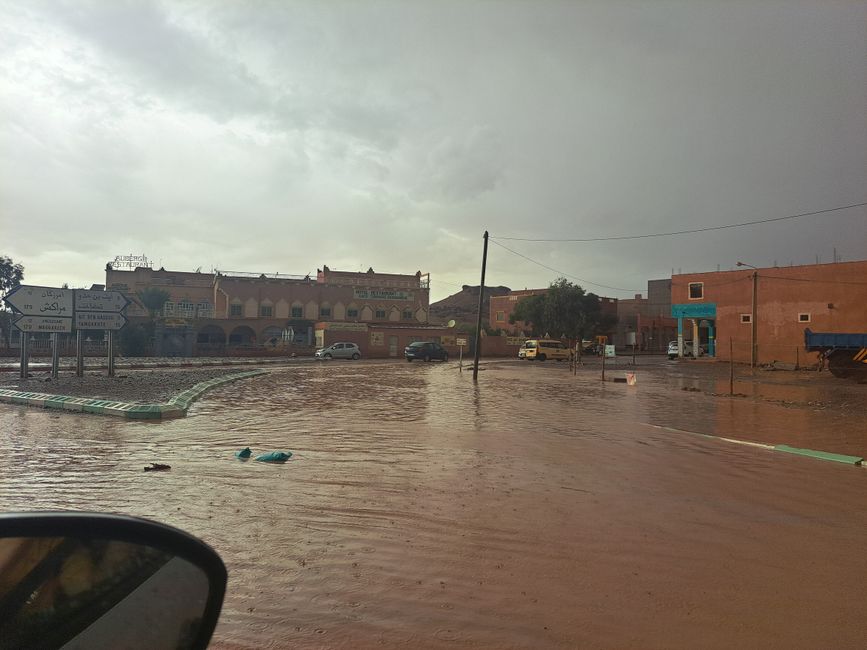
אַבאָנירן צו נעווסלעטטער
The next destination of our journey was the desert. We drove to a village named Mhamid. In Mhamid, it feels like you've reached the end of the world. The road ends here. We parked our car in a garage and were placed in a 4x4 jeep, where we had another 2 hours of driving ahead of us. Our companions Mohammed and Ahmed are Berber nomads and work in the family business, which also includes our camp. They began by telling us that it had rained for two days at the end of September. Small talk about the weather, we thought. But apparently, it was quite the event, and we heard about it over and over. The seemingly crazy thing is that even a bit of grass has grown, and the ground is still moist in certain spots. Due to this curiosity, we passed by two jeeps with Slovak tourists who had gotten stuck in the wet sand. All the other jeeps on the road - there weren't many because most tourists go to the desert, which is not as far away as this one - stopped to help free the vehicle. It was reassuring to see everyone stopping and the solidarity was great. Unfortunately, it was so hot that Näthu burned his hands while pushing. After two hours, we arrived at the camp. We were the only guests. Besides us, only the staff was there, including Mohammed, Ahmed, two cooks, and one chef. The tent was luxurious, and the sand dunes were indescribably beautiful. We were treated like royalty. A four-course dinner was served, of which one course alone would have been enough to satisfy us. I have no idea who thought to serve 1kg of couscous after a large bowl of soup and a huge tagine (I'm not exaggerating with the weight!). Mohammed was very nice and made a significant effort. He explained a lot about Morocco and the Berbers in his broken English/French. Particularly interesting is the mentality of the Berbers. They are truly a very helpful and kind-hearted people. They strongly believe in the Koran and interpret its content mercifully. They don't care who believes in what because that's not their responsibility. It's important to be loving to each other, to respect others as they are, and to support each other. You can really see that in them - their hospitality feels genuine. (I don't know how many liters of tea I can still drink.)
On the second day, we set off on a camel excursion. Ali, an extremely scatterbrained Berber, came to pick us up with three camels. We strutted for about an hour into the desert and set ourselves up under a tree while the animals happily wandered off to graze on the green trees. Ali and Mohammed excitedly told us that it's amazing how much the animals can eat now that it has rained. Normally, they go to an oasis every three days so that the camels can drink and eat. They could theoretically survive much longer without it. Since we read on some websites that camels used for tourism are sometimes treated poorly and rarely get food and water, we were glad to hear this. Nonetheless, we wondered if it was smart to just let the animals run off like that. Well, more on that later. First, cooking was done. Ali and Mohammed made a fire and, of course, tea. Later, they baked chicken in the ashes and bread, burying it in the sand. We ate all of this with a pinch of sand or rather a heap of sand. The wind was crazy, and sand was everywhere: in our ears, eyes, in every body crevice, in the food. However, we weren't completely ungrateful, as the wind provided at least a little cooling in the over 40-degree temperatures. We treated ourselves to a little break in the shade and wanted to head back. We especially wanted to get the ride behind us since nearly everything hurt from the journey there (bruises and scratches are part of camel riding). I subtly asked the guides how they intended to find the camels again. Everyone laughed. It seemed to be a stupid question. 'We track the footprints, of course.' - Two hours later, we were still sitting under the same tree. The gentlemen could no longer find their camels - apparently, the wind had covered the tracks. Ali stood on a dune trying to spot them, Ahmed was nervously running around, and Mohammed was on the phone in the area. We, of course, said nothing but found it quite amusing. Eventually, we managed. For the sunset, we walked up the dunes, and then we could observe the clear, beautiful starry sky. One night, the Berbers even played music by the fire. Otherwise, you could hear nothing for miles. On the second day in the desert, we set off on an excursion with the jeep. The main attraction was again the rain from the last month. We stopped at a small river, photographed the grass, and watched camels feeding on trees. The joy over the rain was immense. Since climate change has been worsening, there are almost no nomads left because hardly any animals survive anymore. It is simply too dry. The only source of income remains tourism. There are very few real nomads left. However, we were able to visit one such family. They live in simple huts and make their living by selling goats. A goat costs about 60 dollars. They invited us for tea and bread. I wonder if they could survive without the tips that tourists who come to visit give them, probably not. It rains too little, and buying feed for the animals is expensive. After the visit, we drove back and rested. The biggest problem we faced, alongside the heat and the wind, was the flies. It's so dry that our sweat was the only water source for the flies. Let's put it this way: we can now really empathize with what it is like to be a Swiss cow.
The return ride from the camp was an experience in itself. We once again felt the kindness of the Berbers. Somewhere in the middle of the desert, two boys were standing and waiting for someone to take them to the next village. We promptly picked them up. Half an hour later, an older woman ran towards us with an empty gas bottle, which we were to take back to the village (and which, presumably, would be picked up later full by someone else). After 2 hours, we were back in civilization and picked up our car, which we drove further with. About 30 minutes before our destination, it began to rain - briefly heavily, but otherwise more of a drizzle. Now, nothing works anymore. The drivers are driving scared at 30 km/h, the roads are flooded, and we barely made it to the parking lot in Ait Ben Haddou. The fastest way would have been through the dried river, but that fills up within 30 minutes, and our new host explains how some people can no longer get back because roads have been flooded. And all this after about 40 minutes of rain. Once again, it is confirmed: rain here is not just a nice 'weather small talk' but truly an attraction.
____________________________
The next destination of our journey was the desert. We traveled to a village called Mhamid. In Mhamid, it seems like you've arrived at the end of the world. The road ends here. We parked the car in a garage and were placed into a 4x4 jeep, in which we had another 2 hours of driving ahead of us. Our guides Mohammed and Ahmed are Berber nomads and work in a family business that also includes our camp. At the outset, they told us that it rained for two days at the end of September. Small talk about the weather, we thought. But it turns out this was an event of major significance, and we heard about it time and again. Surprisingly, a bit of grass had even grown, and the ground is still moist in some places. Because of this oddity, we passed two jeeps with Slovak tourists who were stuck in the wet sand. All the other jeeps on the road - there weren't many because most tourists go to the desert that is less far away than this one - stopped and helped free the car. It was reassuring to see that really everyone stopped and there's a great sense of solidarity. Unfortunately, it was so hot that Näthu burned his hands while pushing the vehicle. After two hours, we arrived at the camp. We were the only guests. Only the staff was there beside us - Mohammed, Ahmed, two cooks, and a chef. The tent was luxurious, and the sand dunes were indescribably beautiful. They treated us like royalty. For dinner, a four-course meal was served, of which one course alone would have been enough to satisfy us. No idea who came up with the idea of serving 1 kg of couscous after a large bowl of soup and a huge tagine (I am not exaggerating about the weight!). Mohammed was very nice and made a great effort. He explained a lot about Morocco and the Berbers in his broken English/French. The mentality of the Berbers is especially interesting. They are truly a very helpful and kind-hearted people. They strongly believe in the Koran and interpret its contents with great compassion. It matters little to them who believes in what, since that is not their responsibility. What is important is to be loving toward one another, to respect one another as they are, and to support each other. You can really see their genuine hospitality. (I don't know how many liters of tea I can still drink).
On the second day, we set off on a camel trip. Ali, an extremely scatterbrained Berber, came to pick us up with three camels. We strolled for about an hour into the desert and set ourselves up under a tree while the animals happily grazed on the green trees. Ali and Mohammed excitedly told us how great it is how much the animals can eat now that it has rained. Normally, they go to an oasis every three days to allow the camels to drink and eat. Theoretically, they could survive much longer without it. Since we've read on several websites that camels used for tourism are sometimes treated poorly and hardly ever receive food and water, we were relieved to hear this. Still, we wondered if it were wise to let the animals run off like that. Well, more on that later. First, they cooked. Ali and Mohammed lit a fire and (naturally!) made tea. Later, they baked chicken in the ashes and bread, which they buried in the sand. We ate all of this with a sprinkle of sand or rather a heap of sand. The wind was howling, and sand was everywhere: in our ears, in our eyes, in every crevice of our bodies, in the food. However, we weren't entirely ungrateful, as the wind at over 40 degrees at least offered a small bit of relief. We allowed ourselves a short break in the shade and wanted to head back. Above all, we wanted to get the ride over with because nearly everything was sore from the ride there (bruises and scratches are just part of camel riding). I discreetly asked the guides how they would find the camels again. Everyone laughed. It seemed like a silly question. 'Of course, we track the footprints.' - Two hours later, we were still sitting under the same tree. The gentlemen cannot find their camels anymore - apparently, the wind has covered the tracks. Ali stood on a dune trying to spot them, Ahmed was running around nervously, and Mohammed was on his phone in the area. We said nothing, of course, but found it quite amusing. In the end, we managed to resolve the situation. For the sunset, we went up the dunes, and then we could see the clear, beautiful starry sky. One evening, the Berbers even played music by the campfire. Apart from that, there was nothing to be heard for miles. On the second day in the desert, we set off with the jeep on an expedition. The main attraction was again the rain from the last month. We stopped at a small river, photographed the grass, and watched how camels grazed on the trees. The joy over the rain was immense. Since climate change is getting worse, there are almost no nomads left, as hardly any animals survive. It is simply too dry. The only source of income remains tourism. There are very few real nomads left. However, we were lucky enough to visit one such family. They live in simple huts and support themselves by selling goats. One goat costs about 60 dollars. They invited us for tea and bread. I wonder if they could survive without the tips that tourists who come to visit them give, perhaps not. It rains too little, and it is expensive to buy feed for the animals. After the visit, we drove back and rested. The biggest problem we had, besides the heat and the wind, were the flies. It is so dry that our sweat was the only source of water for the flies. Let's just say: we can now truly empathize with what it is like to be a Swiss cow.
The return ride from the camp was an experience in itself. Once again, we felt the goodness of the Berbers. Somewhere in the middle of the desert, two boys were waiting for someone to take them to the next village. We promptly picked up both gentlemen. A half-hour later, an older woman ran towards us with an empty gas bottle that we were to take back to the village (and which, presumably, would later be picked up full by someone else). After 2 hours, we were back in civilization and picked up our car, which we then drove on with. Thirty minutes before our final destination, it started to rain - briefly heavily but then more drizzling. Now, almost nothing works. Drivers are driving scared at 30 km/h, the roads are flooded, and we barely made it to the parking lot at Ait Ben Haddou. The fastest way would actually have been across the dried-up river, but that fills up in 30 minutes, and our new host tells us how some people cannot get back due to the flooded roads. And all this after about 40 minutes of rain. Once again, it is confirmed: here, rain is not just a pleasant 'weather small talk' but a real attraction.
אַבאָנירן צו נעווסלעטטער
ענטפער (1)
Je to neuvěřitelně zajímavý vyprávění. Kolik času by mě stálo,tohle všechno napsat…😂asi celou dovolenou!!!!!! Určitě! Ale zážitků máte na roky dopředu! Fakt! A boží fotky❤️💪🏻🙏🏻👏🏻
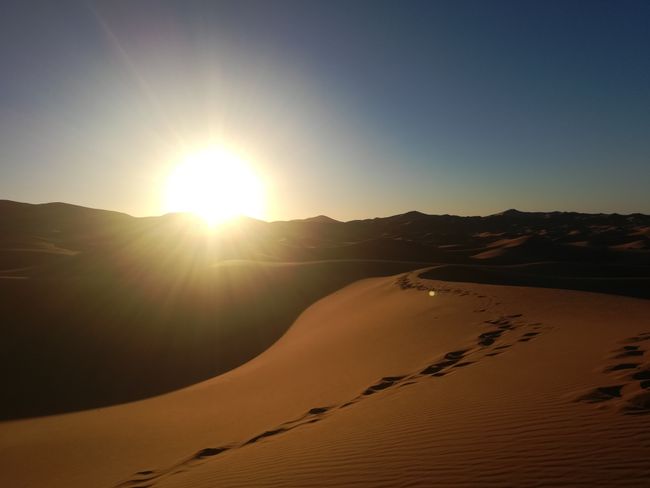
רייזע ריפּאָרץ מאָראָקקאָ
